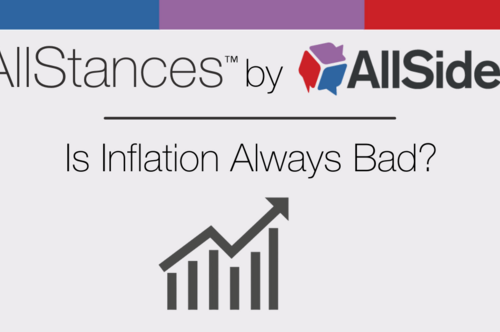
Is inflation always a bad thing that hurts consumers? Or can there be some potential benefits when it’s being controlled at a moderate level? Is the alternative to "inflation/high inflation" totally static prices, or is it predictable 2% inflation?
Explore all opinions, perspectives, stances, and arguments about inflation with AllStances™ by AllSides.
Inflation occurs when prices increase over time throughout an economy. This acts like a tax on everything, meaning each dollar buys less than it did earlier. When prices decrease, as they did during the 2008 recession, it is called deflation. This encourages people and businesses to not spend anything since money will be worth more later.
Over the last several years, there have been very low inflation and low-interest rates which both encourage businesses to invest.
Inflation is most commonly measured by the Bureau of Labor Statistics' Consumer Price Index, which measures a wide range of consumer goods and services across the country.
By a large margin, Americans see growing inflation as the biggest issue in 2022. According to data from Pew Research Center, 70% of Americans view inflation as a very big problem for the country.
When it comes to assessing the effects of inflation, however, concerns differ across party lines. According to a Mar. 2022 poll from Gallup, 79% of Republicans said they worry "a great deal" about inflation, compared to 35% of Democrats.
While some progressives stand by the Federal Reserve's target of 2% inflation, some conservatives believe that the Fed should lower inflation to avoid rising unemployment and interest rates.
Explore the most popular stances and perspectives on inflation along with their supporting arguments. Note that none of these stances support high inflation – there is widespread agreement that high inflation is a problem, though disagreement on how best to address that problem. (Keep in mind that stances aren't mutually exclusive — some viewpoints might align with multiple stances.)
Are we missing a stance or perspective? Email us!
Stance 1: Moderate Inflation Can Have Positive Effects on the Economy
CORE ARGUMENT: Meddling with the natural course of inflation on an aggressive level can be harmful.
More arguments for this stance:
- Inflation is a natural part of the way our economy works.
- Inflation helps drive consumption and economic growth.
- Tackling high inflation on an aggressive level could trigger a global economic recession.
- Inflation triggers more production to meet an aggregated demand.
- Inflation helps soften the Federal Reserve's debt and citizens looking to take out loans or borrow money, which increases spending.
- Inflation can help diminish wealth inequality between working-class and upper-class Americans.
- The raise-taxes strategy being proposed by Congress would only make inflation worse.
- The Federal Reserve has an assuring track record of credibility that will help ensure that the Great Inflation in the ’60s and ’70s will not be repeated.
Stance 2: Inflation is a Big Consumer Issue, But Shouldn’t Always be a Priority Over Other Economic Matters
CORE ARGUMENT: Inflation sometimes overshadows more pertinent issues.
More arguments for this stance:
- Inflation is not strictly a domestic issue; the U.S. will typically experience high levels of inflation along with the rest of the world.
- Reducing tariffs and increased production may help lower some consumer costs.
- The amount of money that the government has spent on initiatives related to diminishing the threat of COVID-19 as well as protecting Ukrainian citizens from Russian forces is more important than keeping inflation levels low.
- A lot of the symptoms that are typically associated with high inflation are confused with corporate greed and companies that choose to take advantage of consumers during a perceived recession. Inflation often stems from large corporations that gouge prices in order to retain control over the market, which ultimately hurts consumers and small businesses.
- The burden of inflation shouldn’t just be placed on Americans as it’s a worldwide issue; international trust and cooperation are the best way to address rising inflation rates.
- Instead of pointing fingers at the Federal Reserve, elected officials should intervene in certain industries to keep specific types of prices that are rising rapidly from further accelerating.
Stance 3: Inflation is a Bad Thing and Should Be Aggressively Combatted
CORE ARGUMENT: Allowing inflation to persist prevents the economy from flourishing and can be a serious burden on all Americans.
More arguments for this stance:
- Inflation punishes middle-class workers that live on fixed incomes by eroding the value of their wages and life savings.
- Inflation is crippling the health care system and the housing market.
- Counterintuitive progressive ideas like reducing the price of consumer goods by raising the cost of producing them or raising taxes on people and companies that produce goods are not only keeping inflation levels high but actually making matters worse.
- Low employment rates are directly linked to high inflation and should be addressed as such.
- The federal government has dangerously undermined the impact of inflation, which places both the hardship and blame on American citizens.
- Politicians who tout progressive policies such as terminating domestic oil production and raising federal interest rates are a part of the problem.
- Rather than making substantial changes to fight inflation, the U.S. government has continued to grossly overspend — fueling inflation rates in the process.
Authors and contributors:
Antonio Ferme, AllSides Weekend Editor, Center bias
Henry Brechter, AllSides Managing Editor, Center bias
Joseph Ratliff, AllSides Daily News Editor, Lean Left bias
Julie Mastrine, AllSides Director of Marketing, Lean Right bias
John Gable, AllSides CEO, Lean Right bias
Ethan Horowitz, News Research Assistant, Lean Right bias











